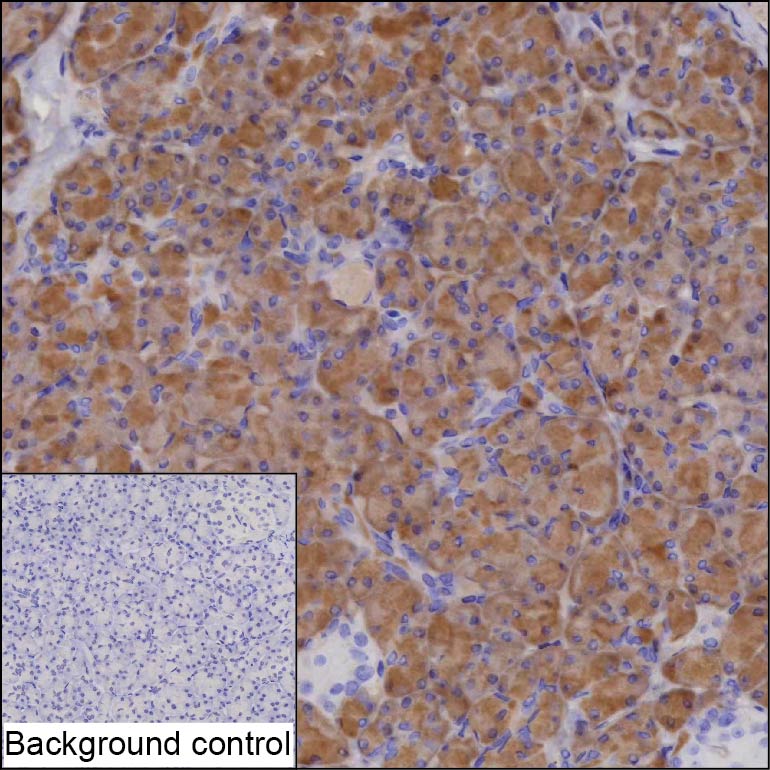
| WB | 咨询技术 | Human,Mouse,Rat |
| IF | 咨询技术 | Human,Mouse,Rat |
| IHC | 1/50-1/200 | Human,Mouse,Rat |
| ICC | 技术咨询 | Human,Mouse,Rat |
| FCM | 咨询技术 | Human,Mouse,Rat |
| Elisa | 1/1000-1/5000 | Human,Mouse,Rat |
| Host/Isotype | Mouse IgG1 |
| Antibody Type | Primary antibody |
| Storage | Store at 4°C short term. Aliquot and store at -20°C long term. Avoid freeze/thaw cycles. |
| Species Reactivity | Human |
| Immunogen | Purified recombinant fragment of human SPINK1 |
| Formulation | Purified antibody in PBS with 0.05% sodium azide |
+ +
以下是关于TLR5抗体的3篇参考文献及其摘要概要:
1. **文献名称**: *The innate immune response to bacterial flagellin is mediated by Toll-like receptor 5*
**作者**: Hayashi, F. et al.
**摘要**: 该研究首次证实TLR5是识别细菌鞭毛蛋白的关键受体,揭示了TLR5在先天免疫中通过识别鞭毛蛋白触发炎症信号通路的机制,为后续抗体开发奠定基础。
2. **文献名称**: *TLR5 agonist antibody conjugates enhance anti-tumor immunity in solid tumors*
**作者**: Burdelya, L.G. et al.
**摘要**: 本文报道了一种TLR5激动剂抗体(CBLB502)在肿瘤模型中的应用,证明其通过激活TLR5信号增强免疫应答,抑制肿瘤生长,并探讨了其与化疗联用的潜在治疗价值。
3. **文献名称**: *Intestinal epithelial cells recognize commensal bacteria via TLR5-mediated signaling pathways*
**作者**: Gewirtz, A.T. et al.
**摘要**: 研究利用TLR5特异性抗体发现,肠道上皮细胞通过TLR5感知共生菌鞭毛蛋白,调控肠道黏膜免疫平衡,并揭示其与炎症性肠病的潜在关联。
*注:上述文献为领域内代表性研究,实际引用时建议通过PubMed或学术数据库核对具体细节及最新进展。*
Toll-like receptor 5 (TLR5) is a transmembrane pattern recognition receptor that plays a critical role in innate immunity by detecting bacterial flagellin, a structural protein of bacterial flagella. Upon ligand binding, TLR5 activates downstream signaling pathways (e.g., MyD88/NF-κB) to trigger pro-inflammatory cytokine production and initiate antimicrobial responses. TLR5 is expressed on immune cells (e.g., dendritic cells, macrophages) and epithelial cells, serving as a frontline defense against pathogenic bacteria like Salmonella and Pseudomonas aeruginosa.
TLR5 antibodies are essential tools for studying its expression, localization, and functional mechanisms. Monoclonal and polyclonal antibodies targeting specific domains (e.g., extracellular leucine-rich repeats or intracellular TIR domain) enable applications such as Western blotting, immunohistochemistry, and flow cytometry. Neutralizing TLR5 antibodies are used to block flagellin-TLR5 interactions in mechanistic studies or therapeutic explorations. Dysregulation of TLR5 signaling has been implicated in infections, inflammatory bowel disease, and cancer, making TLR5 antibodies valuable for both basic research and drug development. Recent studies also explore TLR5 agonists/antagonists as potential immunomodulators, highlighting the antibody's dual utility in diagnostics and therapy.
×